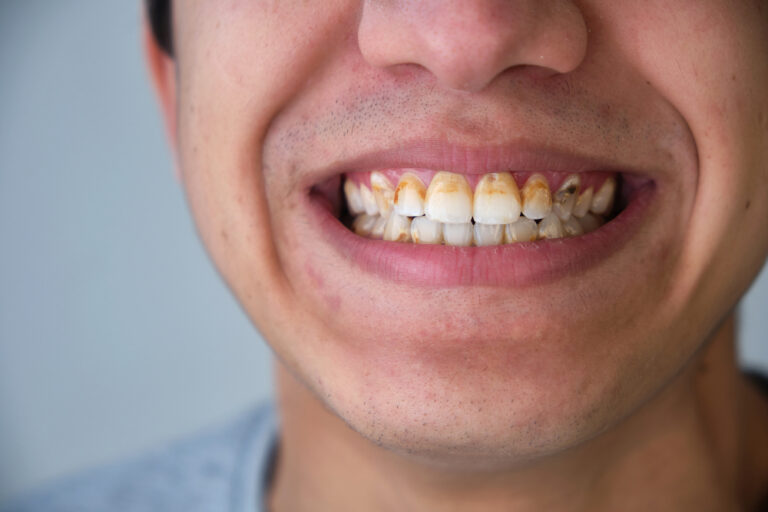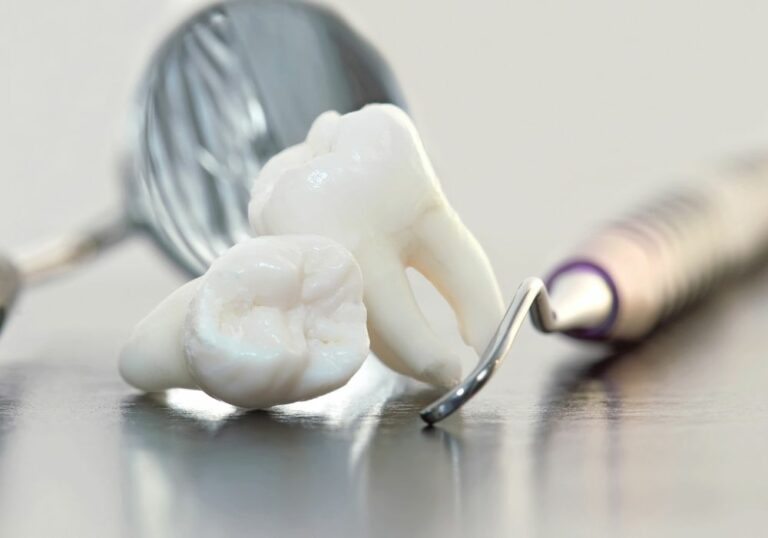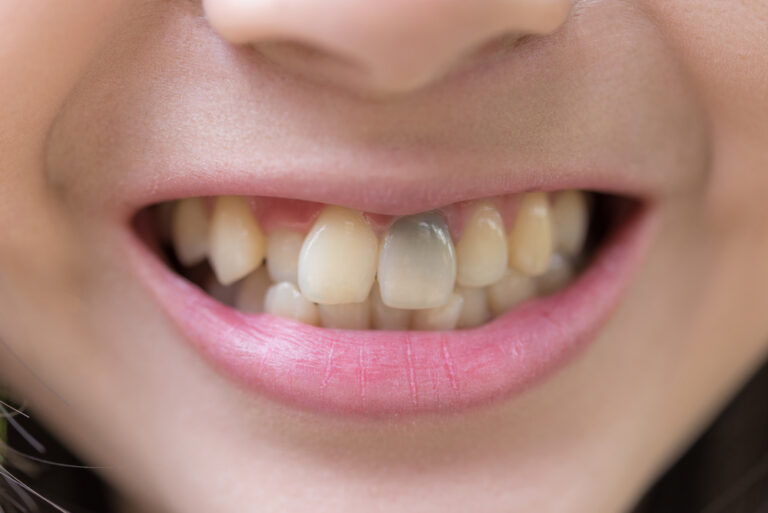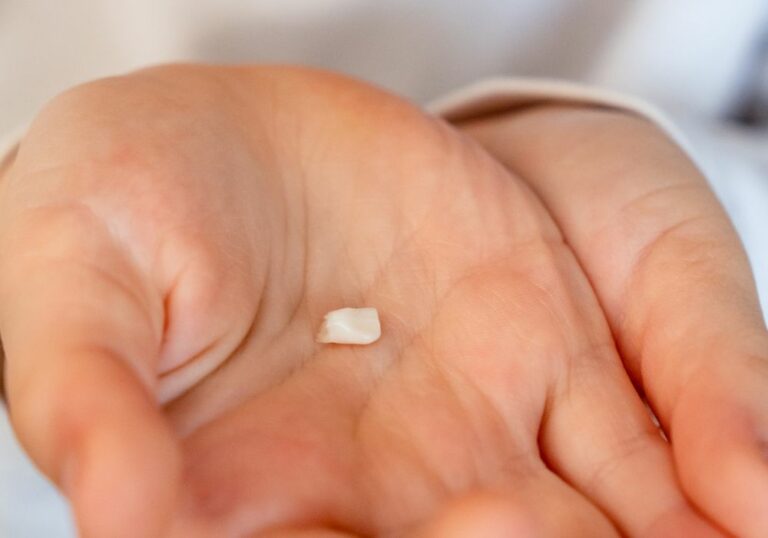Bleeding gums and teeth can definitely be alarming at first glance. But in most cases, minor bleeding is not a major concern and can be easily treated at home with some basic first aid and oral hygiene. However, excessive or prolonged bleeding from the gums or around a tooth may indicate a more serious dental condition that requires professional evaluation and care from your dentist.
This comprehensive article will explore all of the common causes of tooth and gum bleeding, provide tips on how to stop bleeding at home, discuss when bleeding warrants seeing a dentist, overview professional treatment options, and give key prevention strategies. Read on to gain a thorough understanding of why your tooth bleeding may be happening and how to get it under control for good.
What Causes Bleeding Teeth?
There are a number of reasons you may notice blood when brushing, flossing, or touching your teeth. The most common causes include:
1. Gingivitis
Gingivitis is inflammation of the gums caused by a buildup of dental plaque. Plaque is a sticky, colorless film of bacteria that constantly forms on the teeth. The toxins given off by plaque bacteria irritate the gums and cause them to become inflamed. Signs of gingivitis include red, swollen, tender gums that bleed easily when brushing or flossing.
Gingivitis is the early stage of gum disease. If left untreated, it can advance to periodontitis and eventual tooth loss. Luckily, gingivitis is reversible. With a professional dental cleaning and improved daily brushing and flossing, you can treat gingivitis and restore your gums to health.
2. Periodontitis
Periodontitis is a more serious form of gum disease that occurs when gingivitis escalates. Periodontitis causes inflammation not just of the gums but of the deeper periodontal tissues that surround and support the teeth. As the disease progresses, plaque spreads down below the gumline and begins to damage the periodontal ligaments and alveolar bone. This leads to further inflammation, gum recession, formation of deep gum pockets around teeth, and eventual loosening or loss of teeth.
The significant inflammation and destruction happening below the gumline make the gums very prone to bleeding at the slightest irritation, such as brushing and flossing. Bleeding when eating crunchy or hard foods is also common.
3. Dental Trauma/Injury
Any trauma to the teeth or gums can result in bleeding. Common causes of dental injuries leading to bleeding include:
- Aggressive or improper brushing that scratches or cuts the gums
- Flossing too roughly and damaging the gums
- Sports injuries, falls, or blows to the mouth that loosen or chip teeth
- Chewing on hard objects like ice cubes, candies, or pencils that break or injure teeth
- Improper use of dental picks or floss that lacerates gums
- Dental procedures like extractions and implants
4. Medications
Certain prescription medications make patients more prone to bleeding gums. Drugs that thin the blood or interfere with platelets and clotting factors can cause very minor mouth irritations to result in bleeding. Types of medications that may lead to bleeding gums include:
- Anticoagulants/blood thinners like warfarin, heparin, clopidogrel
- Anti-inflammatory medications like aspirin, ibuprofen, naproxen
- Heart medications like digoxin, diltiazem, and amiodarone
- Hypertension drugs like amlodipine, diazoxide, and hydralazine
- Some antibiotics like penicillin, azithromycin, and ciprofloxacin
- Oral contraceptives
5. Pregnancy
The hormonal fluctuations and changes that occur during pregnancy often inflame the gums and make them more prone to bleeding. Gingivitis and a condition called pregnancy gingivitis are particularly common during the 2nd and 8th months of pregnancy, as hormone levels shift and women neglect dental care. However, research shows that diligent oral hygiene and professional dental cleanings during pregnancy can greatly reduce gum bleeding and pregnancy gingivitis.
6. Vitamin Deficiencies
Not getting enough of certain vitamins in your diet can negatively impact gum and oral health. Vitamin C deficiency is associated with gums that bleed easily as well as loose teeth. Vitamin K deficiency impairs the body’s blood clotting abilities. Without these key vitamins, even gentle flossing may cause increased gum bleeding.
7. Blood Disorders
Disorders that affect platelet production and function or the body’s coagulation cascade can result in bleeding gums after very minor trauma. Examples include:
- Hemophilia
- Von Willebrand Disease
- Leukemia
- Lymphoma and other blood cancers
- Liver disease, cirrhosis, hepatitis
- Kidney disease and renal failure
- Anemia
- Immune disorders like HIV/AIDS
8. Oral Cancer
Unexplained bleeding from the gums, tongue, lips or anywhere in mouth that recurs and persists may be an early sign of oral cancer. See your dentist immediately if you experience any bleeding in the mouth accompanied by painful sores or lesions, hoarseness, numbness, or difficulty swallowing. Your dentist should promptly screen for oral cancer when unusual oral bleeding is present along with risk factors like smoking and frequent alcohol use.
Why is the Bleeding So Bad?
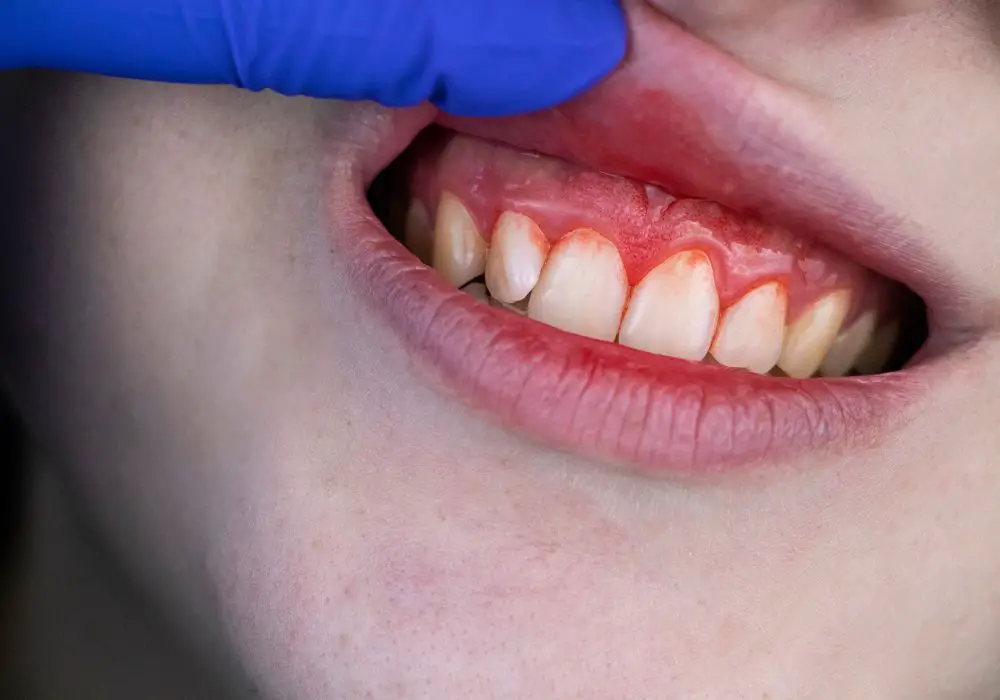
In the vast majority of cases, bleeding that results from brushing, flossing or eating crunchy foods is minor and requires just some simple at-home care. But how do you know when bleeding has become severe or excessive enough to warrant medical attention? Seek prompt care if gum or tooth bleeding:
- Lasts longer than 10-15 minutes
- Reoccurs frequently over several days
- Produces large amounts of pure blood consistently
- Happens spontaneously, without an irritant trigger like brushing
- Occurs along with signs of infection like foul odor, pus, or swollen gums
This type of heavy, persistent bleeding indicates an advanced or complicated dental condition requiring treatment, such as:
- Severe periodontal disease destroying the gums
- Vitamin K or C deficiency
- Oral cancer
- Blood clotting disorders
Don’t be alarmed if you notice a few specks of blood on your toothbrush or floss. But do contact your dentist immediately when bleeding is severe or excessive, as significant blood loss can lead to anemia and other complications. Prolonged bleeding is always abnormal and needs assessment.
How to Stop Bleeding Gums at Home?
For minor gum bleeding caused by daily habits like brushing, these self-care tips can help halt bleeding:
Step 1: Apply firm pressure
After noticing gum bleeding, rinse your mouth with water and then place a cold compress, damp tea bag, or gauze pad directly on the area that is bleeding. Apply continuous firm pressure for at least 10-15 minutes. This helps stimulate formation of a clot to seal injured blood vessels.
Step 2: Rinse mouth with cold salt water
Make a solution of 1 teaspoon salt dissolved in a cup of cold water. Swish this salt water around your mouth for 1-2 minutes, concentrating on the bleeding area, then spit it out. Saltwater rinses have natural antibacterial, soothing properties.
Step 3: Avoid irritants
For several hours after bleeding stops, avoid anything that could re-injure healing gums and trigger further blood loss. Don’t brush, floss, or eat crunchy, spicy foods until gums have had a chance to rest and fully recover.
Step 4: Take over-the-counter pain relievers
Anti-inflammatory medications like acetaminophen (Tylenol) and ibuprofen (Advil) can relieve soreness and gum inflammation that may worsen bleeding.
Step 5: Apply topical gum products
Look for oral care products containing astringents like alum powder or witch hazel. Apply directly to bleeding gums to promote healing.
See a dentist promptly if:
- Bleeding fills your mouth or lasts over 10 minutes
- Heavy bleeding reoccurs with each brushing or meal
- Gums are extremely inflamed, painful and infected
- You easily become lightheaded due to blood loss
Professional Treatment Options for Bleeding Teeth
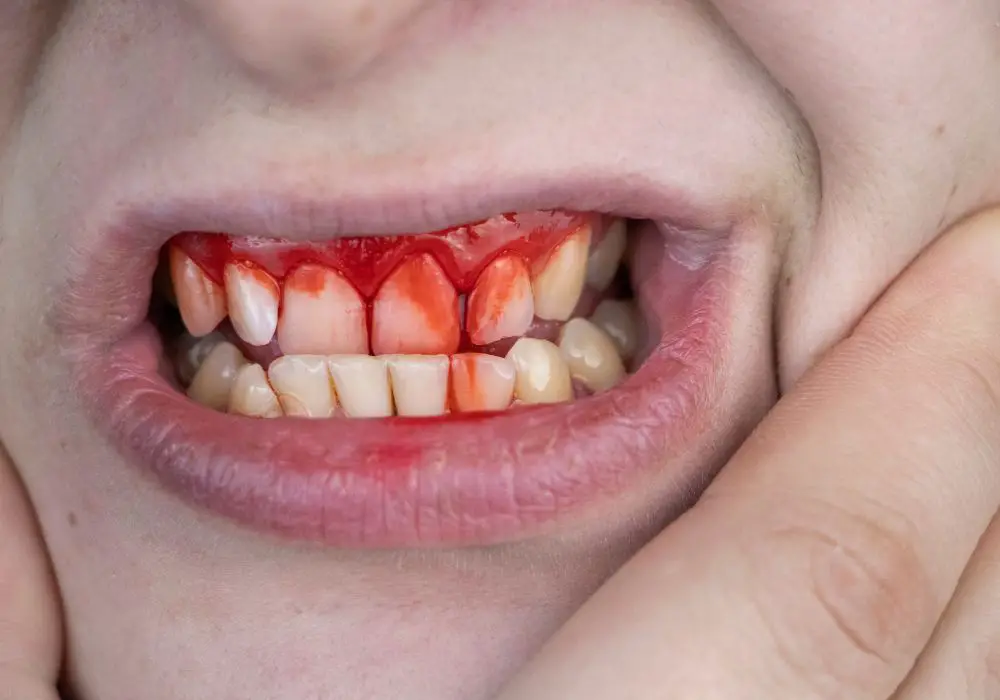
If your gum bleeding persists despite careful oral hygiene and at-home care, make an appointment to see your dentist right away for an evaluation. Be prepared to discuss your symptoms, daily habits, medications, and any other factors that could play a role. Diagnostic tests and imaging may be needed to pinpoint the cause, after which your dentist will recommend appropriate treatment tailored to your situation.
Professional Dental Cleaning
The dentist or hygienist will perform a thorough cleaning above and below the gumline to remove all built-up plaque, tartar, and bacteria. For bleeding associated with gingivitis or early periodontitis, this deep cleaning is often the only treatment needed. They may also smooth rough spots and edges on teeth that can irritate and lacerate gums.
Medicated Oral Rinses
Your dentist may prescribe a daily antibacterial mouth rinse like chlorhexidine gluconate. This supplement to brushing reduces plaque and eases inflammation in bleeding gums.
Antibiotics
For gum bleeding caused by active infection, your dentist may prescribe a short course of broad-spectrum antibiotics like doxycycline, clindamycin or amoxicillin to eliminate bacteria.
Scaling and Root Planing
This intensive deep cleaning procedure is needed to treat advanced periodontal disease. It removes any contaminated gum tissue, smoothes damaged bone, and cleans tooth roots to reduce pockets around teeth. This helps shrink inflamed gums and stop further bone loss.
Gum Surgery
Various surgical procedures can treat severe gum recession and stop bleeding in periodontitis. Examples include flap surgery, bone and tissue grafts, guided tissue regeneration with membranes, and laser gum reshaping.
Dental Splinting/Stabilization
For bleeding due to a dental injury that jarred teeth loose, the dentist may splint affected teeth together for stabilization. This allows ligaments and bone to fully heal.
Nutritional and Medication Evaluation
The dentist will review your diet and medications and have you modify anything that potentially contributes to bleeding risks, such as insufficient vitamin intake or use of blood thinners.
6 Tips to Prevent Bleeding Teeth
Daily oral care habits have a huge impact on gum health and susceptibility to bleeding. Follow these tips to reinforce gums against irritation and inflammation:
- Brush carefully twice a day – Gently brush all surfaces of teeth thoroughly for 2 minutes, taking care not to damage gums. Choose a soft-bristled toothbrush and fluoride toothpaste.
- Floss once daily – Gently slide floss between all teeth to remove debris. Avoid snapping floss against gums which can cut tissue.
- Use antibacterial rinses – Rinsing daily with products like SmartMouth can keep bacteria in check and prevent progression of gum disease.
- Eat a balanced, nutritious diet – Consume plenty of fruits and vegetables rich in bioflavonoids that strengthen gums. Avoid excessive sugary and starchy foods.
- See your dentist every 6 months – Regular professional cleanings and oral cancer screenings are crucial for catching problems early. Report any bleeding to the hygienist.
- Quit smoking and tobacco use – Smoking is a huge risk factor for gum disease and oral cancer. Both of which heighten bleeding risks. Quit now for better health.
FAQs: Common Questions About Bleeding Teeth
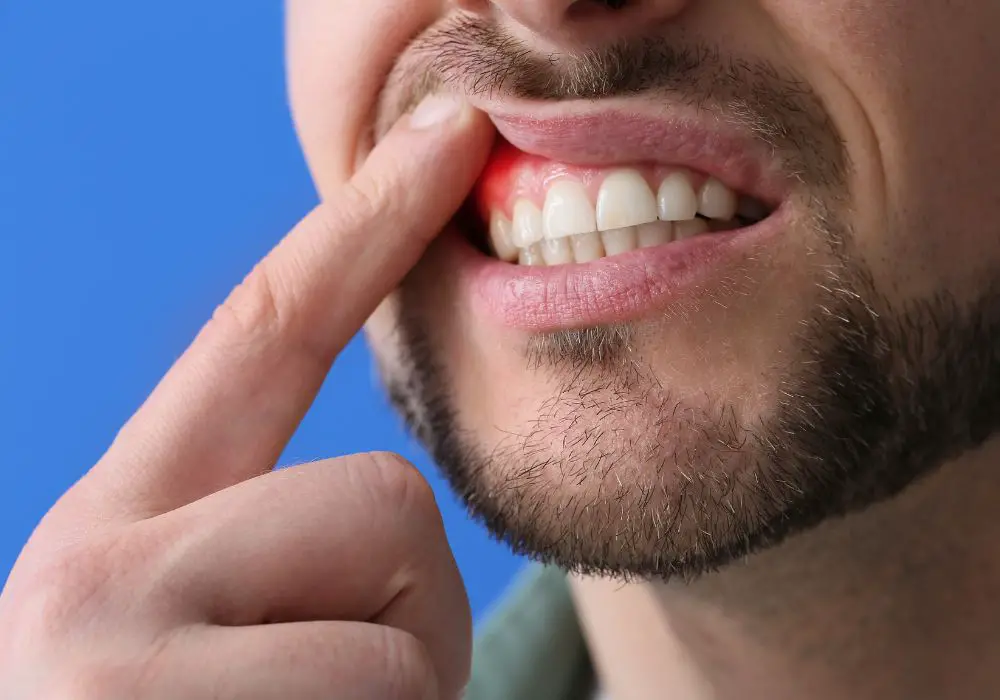
Here are answers to some frequently asked questions about the causes and treatments of bleeding gums and teeth:
Q: What does it mean if there is some blood when I floss my teeth?
A: A small amount of blood with flossing, especially if not done regularly, is fairly normal and not alarming. Just floss gently, and bleeding should resolve within a week as gums adjust to regular flossing stimulation.
Q: Is any gum bleeding always a definitive sign of gum disease?
A: Not necessarily. Occasional minor bleeding from gum irritation is common (gingivitis). With diligent brushing and flossing it often reverses. But any consistent heavy bleeding is abnormal and could signal periodontitis requiring prompt dental intervention.
Q: Can bleeding gums heal without seeing a dentist?
A: Possibly, but only temporarily if it is just gingivitis. Improving oral hygiene may help initially but does not treat an active infection. Any chronic, recurring bleeding warrants examination and possible deep cleanings, antibiotics or gum surgery, so see a dentist.
Q: What foods can I eat to help stop bleeding gums?
A: Foods rich in vitamin C (citrus fruits, berries), vitamin K (leafy greens, dairy), Coenzyme Q10 (organ meats, fish), and bioflavonoids (fruits, nuts) support gum healing and strengthen blood vessels to reduce bleeding.
Q: When should someone go to urgent care or ER for a bleeding tooth?
A: Seek emergency dental care if bleeding is severe, unprovoked, or lasts over 2 hours. Go to the hospital ER immediately if bleeding is excessive, fills the mouth, or you feel faint from blood loss, indicating a major vessel ruptured.
Conclusion
Bleeding from the gums or around teeth is commonly due to plaque-induced gum inflammation. But it may also result from trauma, medications, vitamins deficiencies, infections, or clotting disorders. While often harmless, any persistent or heavy bleeding warrants examination to determine the cause and necessary treatment. With professional dental care combined with diligent daily oral hygiene, gum bleeding can be controlled and your bright smile restored. Be proactive against gum bleeding by brushing properly, flossing daily, eating well, and seeing your dentist regularly.

